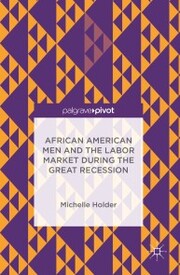Detailansicht
African American Men and the Labor Market during the Great Recession
eBook
ISBN/EAN: 9781137563118
Umbreit-Nr.: 4118702
Sprache:
Englisch
Umfang: 0 S., 1.59 MB
Format in cm:
Einband:
Keine Angabe
Erschienen am 03.11.2016
Auflage: 1/2016
E-Book
Format: PDF
DRM: Digitales Wasserzeichen
- Zusatztext
- This book analyzes the status and position of African American men in the U.S. labor market prior to, during, and after the Great Recession. Using a model of occupational crowding, the book outlines how the representation of African American men in major occupational categories almost universally declined during the recent recession even as white non-Hispanic men were able to maintain their occupational representation in the face of staggering job losses. Using US Census Bureau data, this book illustrates how African American men sought to insulate their group from devastating job losses by increasing their educational attainment in a job market where employers exercised more leverage in hiring. However, this strategy was unable to protect this group from disparate job losses as African American men became further marginalized in the workforce during the Great Recession. Policy approaches to address high African American male unemployment are outlined in the final chapter.
- Kurztext
- This book analyzes the status and position of African American men in the U.S. labor market prior to, during, and after the Great Recession. Using a model of occupational crowding, the book outlines how the representation of African American men in major occupational categories almost universally declined during the recent recession even as white non-Hispanic men were able to maintain their occupational representation in the face of staggering job losses. Using US Census Bureau data, this book illustrates how African American men sought to insulate their group from devastating job losses by increasing their educational attainment in a job market where employers exercised more leverage in hiring. However, this strategy was unable to protect this group from disparate job losses as African American men became further marginalized in the workforce during the Great Recession. Policy approaches to address high African American male unemployment are outlined in the final chapter.
- Autorenportrait
- Michelle Holder is Assistant Professor at John Jay College, City University of New York, USA. Prior to joining academia, she worked as an applied economist. Her reports have received coverage by<i>The Wall Street Journal</i>,<i>The Washington Post</i>,<i>El Diario</i>, and the<i>New York Amsterdam News</i>. Holder possesses a PhD from the New School for Social Research and a BA from Fordham University, both in economics.<br/>
